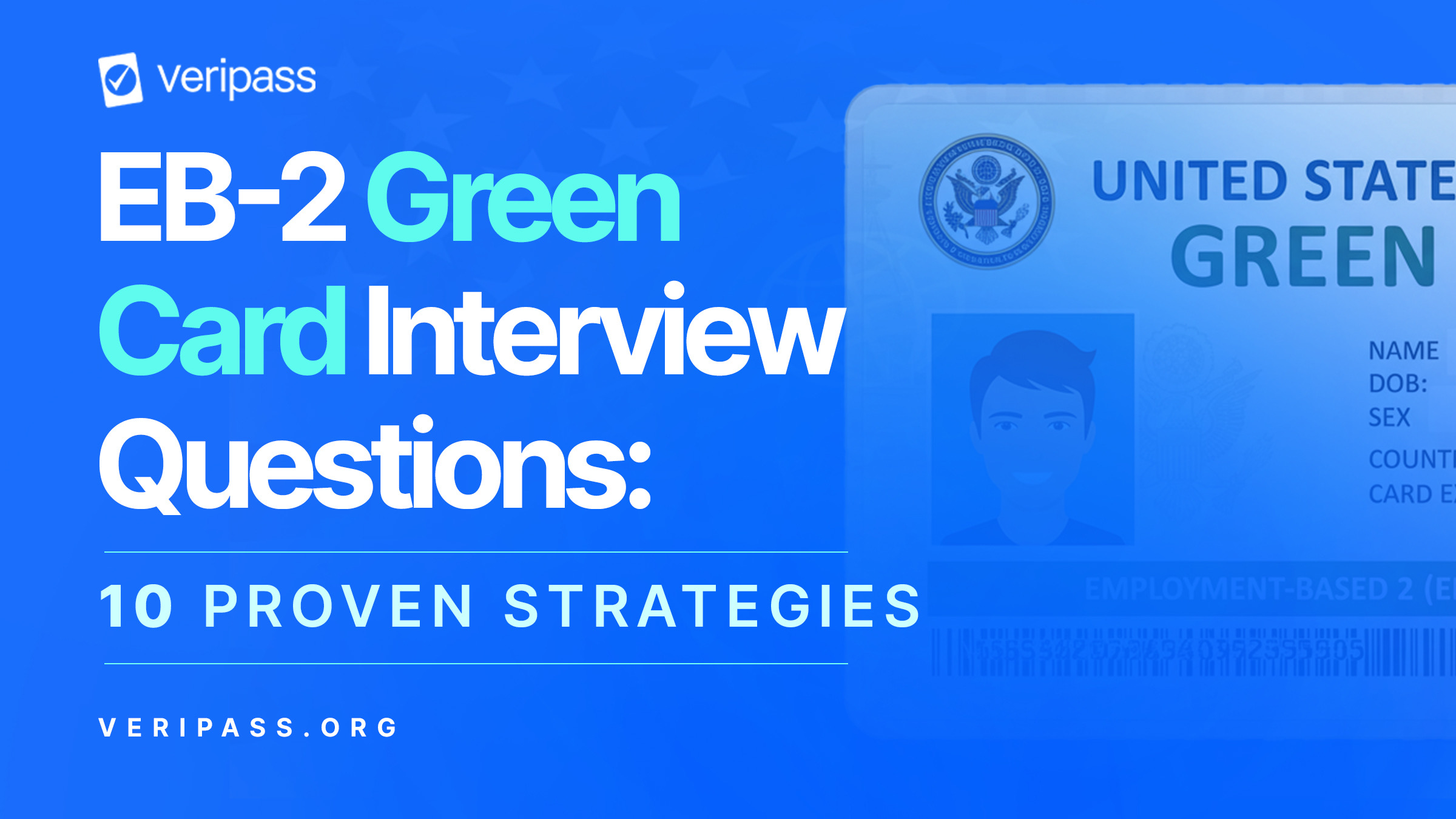Your I-140 is approved. Your interview is scheduled. Then at 2 AM, you wake up in a cold sweat, asking yourself, What if I say the wrong thing and lose everything?
You’re not paranoid. Every year, qualified candidates walk into EB-2 green card interview questions completely unprepared and walk out with denials. Not because their credentials weren’t good enough. Not because their case was weak. But because they gave one answer that didn’t match their paperwork. One hesitation made the officer suspicious. One explanation raised a red flag.

Here’s what nobody tells you about EB-2 green card interview questions: immigration officers aren’t there to help you pass. They’re trained to test your story, spot inconsistencies, and catch people who aren’t ready. One wrong word can trigger months of delays, a Request for Evidence, or a flat-out denial that destroys years of work.
This article gives you what those generic prep guides won’t: the actual tough questions officers ask, the specific mistakes that get people rejected, and exactly how to answer when you don’t have a perfect response. No fluff. Just the information that keeps your green card on track.
Read Also: EB-2 NIW Case Filing 2025
What Are EB-2 Green Card Interview Questions Really Testing?
When you walk into that interview room, the officer has three goals:
- Verify you’re who you claim to be: They’re matching your face to your documents and your story to your application.
- Confirm your job offer is legitimate: They want proof that this isn’t a fake arrangement to obtain a green card.
- Catch fraud or misrepresentation: They’re looking for red flags that suggest you lied on your petition.
The EB-2 green card interview questions you’ll face are designed to test these three things. Some questions are straightforward. Others are traps. You need to know the difference.
The Standard EB-2 Green Card Interview Questions (That Everyone Expects)
Let’s start with the basics. These are the questions you’ll definitely face:
About Your Sponsoring Employer:
- What does your company do?
- What’s your exact role?
- How did you find this job?
- Who will you report to?
- What’s your salary?
About Your Qualifications:
- What degrees do you hold?
- Where did you get your education?
- What’s your work experience?
- Why are you qualified for this specific position?
About Your Current Status:
- What visa are you on now?
- Have you maintained legal status?
- When did you last enter the U.S.?
- Have you worked without authorization?
These questions are easy if you’re telling the truth and your documents match your story. But here’s where it gets interesting, and where most people aren’t prepared.
The EB-2 Green Card Interview Questions That Actually Trip People Up
This is the section that other articles skip. These are the questions that expose weak cases or catch people off guard:
1. Your Job Title Changed Since Your I-140 Was Filed. Why?
If your role evolved after your I-140 approval, you need a good explanation. Officers know that job changes can signal you’re no longer doing what was approved. Your answer needs to demonstrate that the change was minor or a natural progression, rather than a complete shift.
Bad Answer: “Oh yeah, my boss moved me to a different department because they needed help.”
Better Answer: “My core responsibilities remain the same. The title reflects additional leadership duties I took on, but I’m still performing the role outlined in my I-140.”
2. You’re Making More Money Now Than What Was Listed. Explain That.
A higher salary can look suspicious. Officers might think the original offer was fake or that you switched jobs without proper authorization.
Bad Answer: “I negotiated a raise.”
Better Answer: “My employer adjusted my compensation to reflect cost-of-living increases and my performance, but the job duties and my role remain consistent with my approved petition.”
3. Why Should We Approve YOUR Case Specifically?
This is a trap question. They’re not asking you to brag. They’re testing if you understand why you qualified for EB-2 in the first place.
Bad Answer: “I’m really good at my job and work hard.”
Better Answer: “My advanced degree and specialized experience in [field] address a critical need in [industry/area], which is why my employer sponsored me under EB-2.”
4. Have You Ever Worked for Anyone Other Than Your Sponsor?
If you used AC21 portability (changing employers after your I-140 was approved), this question is loaded. You need to prove the new job is in the same or a similar field.
Bad Answer: “Yes, I switched companies because I got a better offer.”
Better Answer: “I invoked AC21 portability after my I-140 was approved for more than 180 days. My new position is in the same occupational classification and meets all requirements.”

5. Questions That Test Consistency With Your Spouse’s Answers
If your spouse is at the interview, officers may separate you and ask the same questions to both of you. If your answers don’t match, you’re in trouble.
Common questions they’ll cross-check:
- How did you meet?
- When did you get married?
- Where do you live?
- What does your spouse do for work?
- Do you have joint financial accounts?
Red Flags That Make Officers Dig Deeper During EB-2 Green Card Interview Questions
Immigration officers are trained to spot these warning signs:
- Employment gaps: If you weren’t working for months after your I-140, they’ll want to know why.
- Salary too low: If your pay is way below market rate, they’ll question if the job is real.
- Recent marriage: If you got married right before filing, expect more scrutiny.
- Multiple address changes: Frequent moving can suggest instability or potential fraud.
- Inconsistent work history: If your resume doesn’t match what you told USCIS, you’re in trouble.
If any of these apply to you, prepare a clear, honest explanation before the interview.
What NOT to Say During Your EB-2 Green Card Interview Questions
Words matter. Here are phrases that raise red flags:
“I’m not sure” (when asked about your job duties), “That’s not exactly accurate” (about information in your petition), “My lawyer handled that” (when asked about your application), “I don’t remember” (about key dates or events), “I think so” (when asked yes/no questions)
These answers make you look unprepared or dishonest. Even if you’re nervous, avoid vague language.
How to Handle EB-2 Green Card Interview Questions When You Don’t Know the Answer
Sometimes you’ll face a question you genuinely can’t answer. Here’s how to respond without hurting your case:
If You Need Clarification: “I want to make sure I understand correctly. Are you asking about [rephrase the question]?”
If You Don’t Remember Exact Details: “I don’t recall the exact date, but it was approximately [time frame]. I can provide documentation if needed.”
If the Question Is Outside Your Knowledge: “That’s a detail my attorney handled. I can get you that information if it’s required.”
Don’t guess. Don’t lie. If you truly don’t know, say so, but offer to provide proof or documentation.
Special Considerations for EB-2 NIW Interview Questions
If you’re applying through the National Interest Waiver, your EB-2 green card interview questions will be different. Officers will focus on:
- Why your work benefits the United States: You need to clearly explain the national importance of what you do.
- How you’ll continue this work: They want proof you’ll actually do what you claimed in your petition.
- Evidence of your achievements, publications, patents, awards, and media coverage, bring everything.
For NIW cases, the interview is less about your employer and more about YOU. Be ready to talk about your impact, not just your job.
What Happens If Your EB-2 Green Card Interview Goes Badly?
Not every interview ends with approval. Here’s what can happen:
Administrative Processing: The officer needs more time to review your case. This can take weeks or months.
Request for Evidence (RFE): They want additional documents to verify your claims. This isn’t a denial, but it’s a delay.
Denial: Your application is rejected. You’ll need to appeal or reapply.
If you get an RFE or denial, don’t panic. Many cases are saved with the right response. But this is where having professional support matters.
How VeriPass Prepares You for EB-2 Green Card Interview Questions
Here’s the truth: most people go into these interviews underprepared. They think reading a checklist is enough. It’s not.
At VeriPass, we handle the entire EB-2 process from start to finish, and that includes preparing you for the interview. Here’s how we help:
We Build Your Case to Minimize Interview Risk. The best way to handle tough EB-2 green card interview questions is to structure your petition so those questions never get asked. We position your qualifications, work history, and documentation in a way that leaves no room for doubt.
We Run Mock Interviews. We don’t just tell you what questions to expect—we actually practice with you. We ask the hard questions, the trick questions, the ones that expose weak spots in your story. By the time you sit in front of an immigration officer, you’ve already been through it with us.
We Prepare You for Red Flags in Your Case. If you have employment gaps, job changes, or anything else that might raise questions, we develop clear, honest explanations that satisfy USCIS requirements. We don’t ignore problems; we address them head-on.
We handle RFEs and Denials. If your interview doesn’t go as planned, we respond to RFEs and appeals with precision. Our EB-2 NIW RFE approval rate is significantly higher than average because we know exactly what USCIS is looking for.
We Stay With You Until You Get Your Green Card. This isn’t a one-time service. From petition filing to interview prep to green card approval, we’re with you every step of the way. You’re not figuring this out alone.

Final Preparation Tips for Your EB-2 Green Card Interview Questions
As your interview date approaches, here’s what you need to do:
Review Every Document You Submitted. Know your I-140, your resume, your diplomas, your employment letters, everything. Officers will test if you know your own case.
Practice Answering Out Loud. Don’t just think about your answers. Say them out loud. It helps you sound confident and clear.
Dress Professionally. First impressions matter. Wear business attire. Show respect for the process.
Arrive Early: Give yourself time for security checks and registration. Rushing makes you nervous.
Bring Original Documents. Even if you submitted copies, bring originals to the interview. This includes your passport, birth certificate, diplomas, and employment letters.
Stay Calm. If you get a tough question, take a breath before answering. It’s okay to pause and think.
The Bottom Line on EB-2 Green Card Interview Questions
Your EB-2 interview isn’t something to take lightly. The questions you’ll face go beyond the generic checklist most people prepare for. Officers are trained to test your story, spot inconsistencies, and catch fraud.
If you go in unprepared, you’re gambling with your future. One bad answer can delay your green card or sink your case entirely.
But if you prepare the right way, with honest answers, clear documentation, and professional support, you’ll walk out of that interview room with approval.
Ready to Make Sure Your EB-2 Interview Goes Smoothly?
VeriPass specializes in helping exceptional professionals like you get their EB-2 green cards without stress or delays. We don’t just file paperwork; we prepare you for every step, including the interview.
Join our free webinar where we break down the exact strategy we use to get our clients approved. You’ll learn what immigration officers are really looking for, how to handle tough questions, and what mistakes to avoid.
Watch the webinar here and take control of your EB-2 process today.
Is there an interview for EB-2 green card?
Yes, most EB-2 green card applicants need to attend an interview. If you’re already in the U.S., you’ll have an adjustment of status interview with USCIS. If you’re outside the U.S., you’ll go through consular processing at a U.S. embassy or consulate. The interview verifies your identity, confirms your qualifications, and checks that your job offer is legitimate. In some cases, USCIS may waive the interview, but this is rare and not guaranteed. You should always prepare as if you’ll be interviewed.
How to pass a green card interview?
You pass by being prepared, honest, and consistent. Review every document you submitted: your I-140, resume, employment letters, and educational certificates. Know your job duties, salary, and employer details by heart. Practice answering questions out loud so you sound confident. Bring all original documents, including your passport, birth certificate, marriage certificate (if applicable), and medical exam results. Answer questions directly without over-explaining. If you don’t know something, say so rather than guessing. Dress professionally, arrive early, and stay calm. The key is making sure your answers match what’s in your petition exactly.
What questions are asked in a J-2 visa interview?
J-2 visa interviews focus on your relationship to the J-1 visa holder (your spouse or parent). Officers typically ask: How did you meet your spouse? When did you get married? Where does your spouse work or study? What will you do in the U.S.? Do you plan to work (you’ll need an Employment Authorization Document)? They may also ask about your financial support, living arrangements, and plans after the J-1 program ends. Bring your marriage certificate, photos together, and proof of your spouse’s J-1 status. The interview is usually short and straightforward if your relationship is genuine.
How difficult is an EB-2 visa?
The EB-2 visa is challenging but not impossible if you meet the requirements. You need either an advanced degree (master’s or higher) or exceptional ability in your field, plus a job offer from a U.S. employer (unless you qualify for a National Interest Waiver). The hardest parts are the PERM labor certification process, which can take months, and waiting for your priority date to become current, which can take years, depending on your country. The paperwork is complex, and mistakes can cause delays or denials. However, if your qualifications are strong and your case is well-prepared, approval rates are high. Working with professionals who understand USCIS standards makes the process much smoother.
